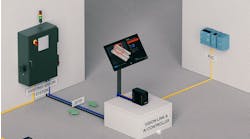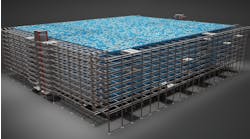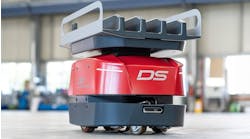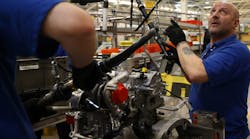Toyota and Nissan Motor Co., Japan's largest automakers, were spared from Trump's critique by name on the campaign trail. Yet, along with General Motors Co. and VW, they all rely on Mexican plants for millions of vehicles and a high volume of parts. That puts them at risk if the president-elect makes good on his threat to levy hefty taxes on cars assembled across the Rio Grande.
"Trump could, or will, try to set up trade barriers," said Ferdinand Dudenhoeffer, director of the Center for Automotive Research at the University of Duisburg-Essen in Germany. "Automakers with U.S. factories will therefore be on the winning side. Mexico, the new El Dorado of the auto industry, could suffer."
Since 2010, nine global automakers, including GM, Ford and Fiat Chrysler Automobiles NV, have announced more than $24 billion in Mexican investments. VW's Audi, BMW AG and Daimler AG each build or plan to assemble luxury vehicles, engines or heavy trucks in the low-cost country, which Trump says has benefited at the expense of the American voters who propelled him to victory. Output in Mexico may more than double this decade, from 2 million to 5 million vehicles, according to the Center for Automotive Research in Ann Arbor, Michigan.
The Republican candidate and real-estate developer grabbed headlines during his campaign by threatening to slap a 35% tariff on any cars Ford builds in Mexico and ships back to the U.S. He called Ford's plans for a new plant in Mexico "an absolute disgrace." A levy would lead to higher prices and hurt demand, said Joe Spak, an analyst at RBC Capital Markets.
Trump would "start a worldwide trade war" if he decides to end trade pacts and uses anti-dumping provisions to impose widespread tariffs on other countries, said Donald Grimes, an economist at the Institute for Research on Labor, Employment and the Economy at the University of Michigan. The North American Free Trade Agreement, for example, requires only six months' notice of termination to Canada and Mexico and doesn't specify that the president would need congressional approval, he said.
"These other countries would retaliate. Prices consumers would pay would increase sharply. The Federal Reserve would then increase interest rates. It would be ugly," Grimes said.
Despite that threat, U.S. automakers and the United Auto Workers union extended an olive branch to the president-elect.
"We agree with Mr. Trump that it is really important to unite the country -- and we look forward to working together to support economic growth and jobs," Ford said in a statement. The company's plan to shift small-car production from a factory in Michigan to Mexico was attacked by Trump during his first answer of the initial debate with Democratic candidate Hillary Clinton in September.
GM and Fiat Chrysler said in separate statements they would work with Trump and the new Congress on policies that support U.S. manufacturing. UAW President Dennis Williams, whose union endorsed Clinton, told reporters at a roundtable Thursday that "I'm prepared to sit down and talk to him on trade. NAFTA is a huge problem to the American people."
German executives attending an industry conference in Munich on Wednesday also expressed concerns about Trump's views. BMW is building a new car plant in Mexico's San Luis Potosi that's due to start production in 2019, while Audi started assembling autos in San Jose Chiapa in September.
"We need open trade," said BMW CEO Harald Krueger. The luxury automaker ships many of the SUVs assembled at its South Carolina factory to markets around the world and in turn exports sedans and Mini cars to the U.S. from Europe. "We live off exports and imports. The U.S. market is fundamental for us."
NAFTA has created a "highly integrated" auto market in North America that is critical to the fortunes of all global carmakers operating in it, said Sean McAlinden, an automotive economist based in Ann Arbor.
"To interrupt the flow of trade across either border, Canadian or Mexican, would really throw more than a monkey wrench into the machine," McAlinden said. "It would create a very, very noncompetitive North American auto industry."
Conciliation Hopes
Daimler CEO Dieter Zetsche and James Verrier, who heads supplier BorgWarner Inc., are among executives who held out hope that much of Trump's trade talk was campaign rhetoric and would soften with the practicalities needed to govern. "Many things get said during the heat of an election campaign," Zetsche said. "I hope and believe this is also the case here."
For Bob Lutz, the retired vice chairman of GM, Trump's victory could ultimately help the auto industry if his advisers and Congress keep him from pushing his protectionist agenda too far.
"He's not a dictator," Lutz said in an interview. "No one can go in and abrogate trade deals. There are some aspects of NAFTA that will probably be re-negotiated, but he will probably be talked out of his crazier ideas."
Rather than threaten Japan auto imports with tariffs, Trump has pointed to wealth generated from the cars being sold in the U.S. to bolster his argument for America to pay a smaller share of the costs related to stationing troops in its biggest Asian ally's territory.
"Japan is ripping us off with the cars," Trump said at an Oct. 12 campaign event in Florida. In remarks to Ohio volunteers in July, he spoke of "massive ships" delivering vehicles to the U.S. from Japan, which he told Americans was " rich because of us."
Representatives for Toyota, Nissan and Honda Motor Co. declined to comment.
Japan's automakers have combined capacity to build about 1.36 million vehicles annually in Mexico and have announced plans for new plants capable of assembling another 430,000 vehicles a year. Models built or planned for Mexican production and sale in the U.S. include the Toyota Corolla, the Nissan Versa and Sentra, and the Honda Fit and HR-V.
"If NAFTA is going to be up for discussion somewhere down the line, that would affect Japanese companies very much, especially auto-related investments in Mexico," said Bob Takai, president and CEO of Sumitomo Global Research Co. "If the trading and investing is going to be very difficult because of the new presidency, we may go somewhere else."
By Craig Trudell, Elisabeth Behrmann and Keith Naughton (Bloomberg)










